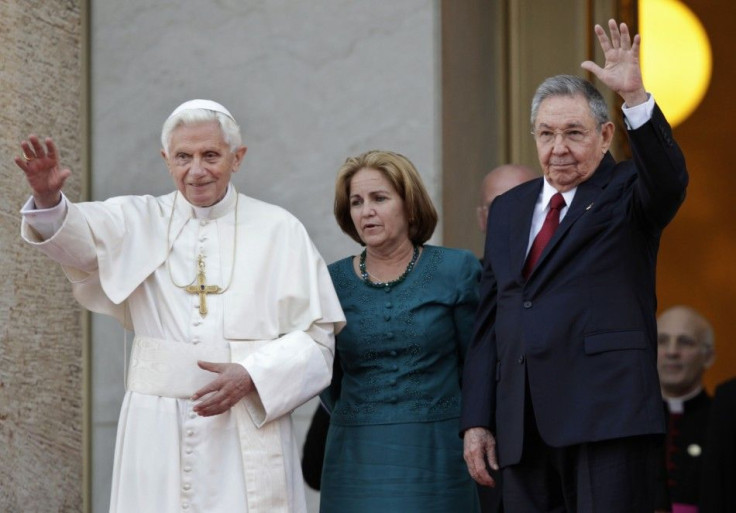Pope Benedict XVI Wraps Up Cuba Trip

Pope Benedict XVI prepared Wednesday to end his three-day trip to Cuba with an open-air mass in Havana's Revolution Plaza and a meeting with the former leader of the communist island, Fidel Castro.
The pontiff arrived in Santiago, Cuba on Monday to boost the Catholic Church's influence and to encourage Cubans to build a renewed and open society, a better society, reported the Los Angeles Times.
In a welcoming ceremony at the Jose Marti Airport, Pope Benedict reached out to Cubans.
I carry in my heart the just aspirations and legitimate desires of all Cubans, wherever they may be. Their sufferings and their joys, their concerns and their noblest desires those of the young and the elderly, of adolescents and children, of the sick and workers, of prisoners and their families, and of the poor and those in need.
Before arriving in the capital, Pope Benedict prayed to Our Lady of Charity Basilica, the holy shrine to Cuba's patroness. His visit coincided with the 400th anniversary of the doll-sized, wooden statue's discovery.
After participating in his own personal pilgrimage, Pope Benedict arrived Tuesday in Havana, where he met with Raul Castro, who succeeded his older brother as president.
In an hour-long closed meeting, Raul Castro and Pope Benedict exchanged gifts. Pope Benedict also requested that Good Friday become a national holiday in Cuba. The U.S. State Department estimates about 60 percent of the Cuban population is Catholic.
On Wednesday, Pope Benedict delivered a mass for tens of thousands in Revolution Plaza. Some Cubans see the pontiff's visit as a beacon of hope that someday Cuba may abandon its socialist economic model.
We are hoping for a miracle, Rafael Rodriguez, who was selling fluorescent light bulbs from a stool in the picturesque but crumbling Old Havana section of Havana, told Los Angeles Times. The pope can be a mediator for peace and tranquility.
Cuban officials, however, have refuted claims to political reform. In Cuba there will not be political reform, said Marino Alberto Murillo Jorge, minister of economy.
Raul Castro has been moving the nation toward an economic transition --including an end to government subsidies on certain goods, massive layoffs of state workers and the encouragement of small private businesses. These moves, however, are considered separate from any political change.
The nation is invariable continuing to change everything that needs to be changed, in keeping with the highest aspirations of the Cuban people, he said.
The pope's visit to Cuba was symbolically important as as the church assumes a greater role as a human rights advocate. Indeed, the Cuban church has played a key role in the release of hundreds of political prisoners.
The anticipated meeting of Pope Benedict and Fidel recalled the first time a pontiff visited Cuba with the intention of carrying a similar message of freedom and openness. In 1998, Pope John Paul II visited Cuba and was also greeted by Fidel Castro.
At the time, Pope John Paul II delivered a decidedly anti-Communist message through four homilies and seven public speeches, the Miami Herald said. It is the hour to take new roads required as the world approaches the Third Millennium, said the late pope.
Prior to his arrival in Cuba, Pope Benedict remarked it was time for Havana to change. He criticized the U.S. for imposing sanctions on the island, which have been in place for 50 years.
© Copyright IBTimes 2024. All rights reserved.





















